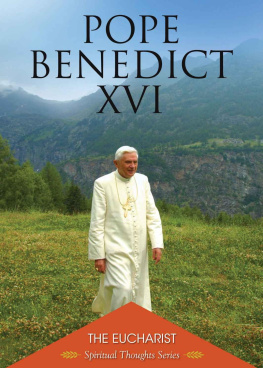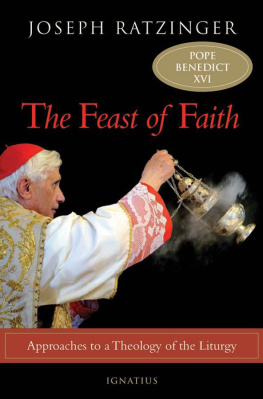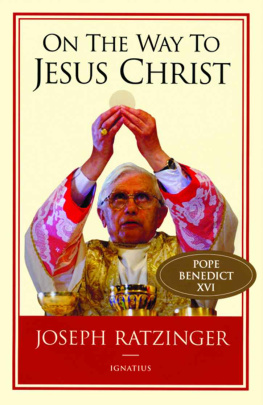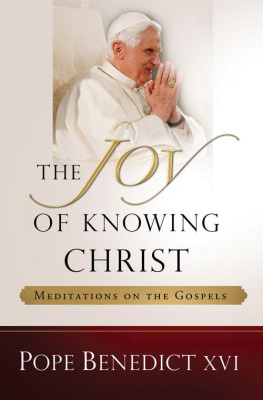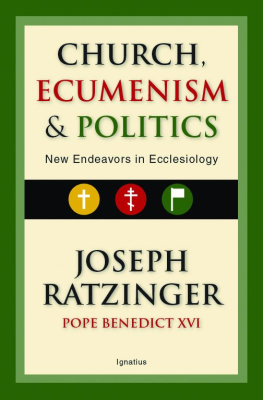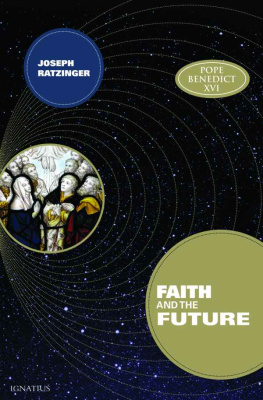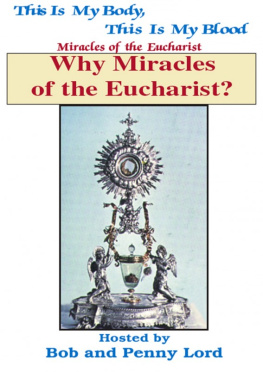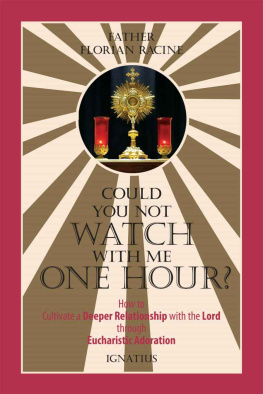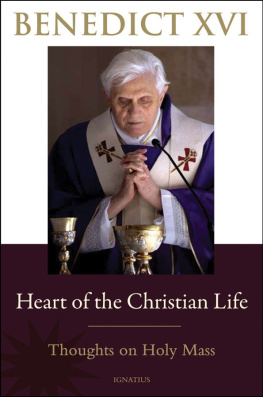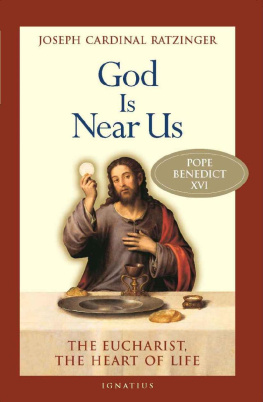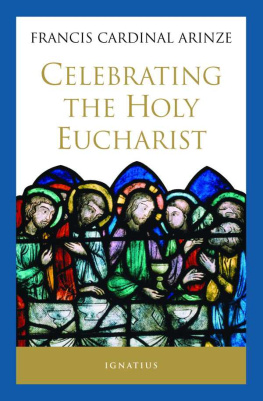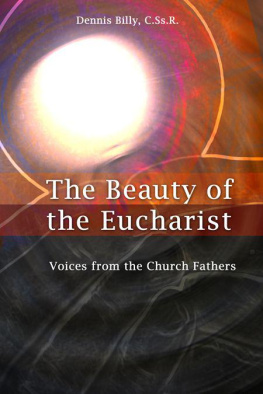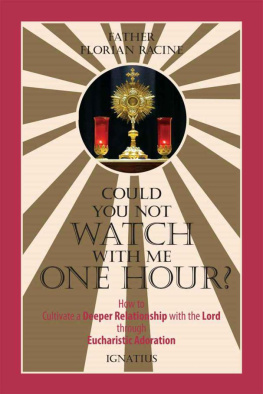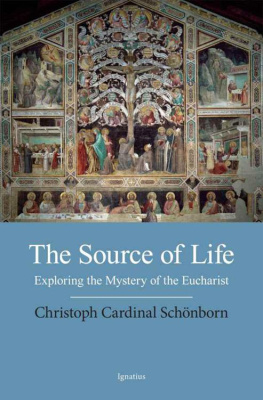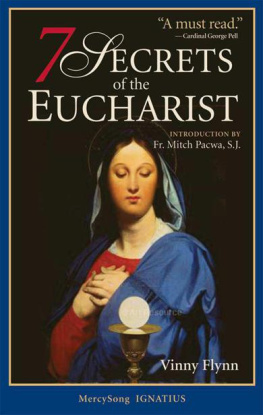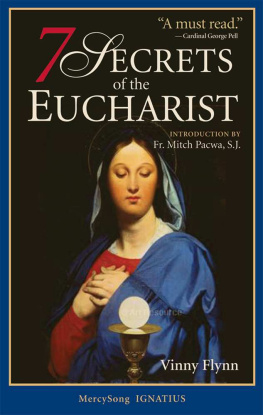Benedict XVI - The Eucharist (Spiritual Thoughts)
Here you can read online Benedict XVI - The Eucharist (Spiritual Thoughts) full text of the book (entire story) in english for free. Download pdf and epub, get meaning, cover and reviews about this ebook. year: 2009, publisher: USCCB, genre: Religion. Description of the work, (preface) as well as reviews are available. Best literature library LitArk.com created for fans of good reading and offers a wide selection of genres:
Romance novel
Science fiction
Adventure
Detective
Science
History
Home and family
Prose
Art
Politics
Computer
Non-fiction
Religion
Business
Children
Humor
Choose a favorite category and find really read worthwhile books. Enjoy immersion in the world of imagination, feel the emotions of the characters or learn something new for yourself, make an fascinating discovery.
- Book:The Eucharist (Spiritual Thoughts)
- Author:
- Publisher:USCCB
- Genre:
- Year:2009
- Rating:5 / 5
- Favourites:Add to favourites
- Your mark:
- 100
- 1
- 2
- 3
- 4
- 5
The Eucharist (Spiritual Thoughts): summary, description and annotation
We offer to read an annotation, description, summary or preface (depends on what the author of the book "The Eucharist (Spiritual Thoughts)" wrote himself). If you haven't found the necessary information about the book — write in the comments, we will try to find it.
The Eucharist (Spiritual Thoughts) — read online for free the complete book (whole text) full work
Below is the text of the book, divided by pages. System saving the place of the last page read, allows you to conveniently read the book "The Eucharist (Spiritual Thoughts)" online for free, without having to search again every time where you left off. Put a bookmark, and you can go to the page where you finished reading at any time.
Font size:
Interval:
Bookmark:
BENEDICT
XVI

Spiritual Thoughts Series
Preface by Cardinal Francis George, OMI
Introduction by Lucio Coco
United States Conference of Catholic Bishops
Washington, D.C.
S anctity is unity with God through Jesus Christ. The Holy Eucharist unites us intimately with Christ and is the ordinary means of receiving Christs life anew each day of our journey from Baptism to heaven. Those who receive this most blessed sacrament together know they are on the same path to unity with God, and receiving this pledge of salvation stirs up in their hearts the desire to invite others to the same banquet.
Pope Benedict XVI comments on theological themes related to the Eucharist and shares his own thoughts on this sacrament of unity. His synthetic grasp of the mysteries of faith brings into unity the many facets of what remains always a reality beyond our intellectual grasp. These reflections open us to the heart of our religion and more, because the Eucharist is at the heart of reality itself. Everything comes together in Christ. Each time we receive him under the forms of bread and wine, we rekindle our hope by placing ourselves within the moment when we will all come to grasp how God has worked throughout human history to bring good out of the evil our sins have caused.
The Holy Eucharist is the sacramental Body of Christ. It therefore creates the Body of Christ that is the Church. The Church cannot be understood apart from the Eucharist. The Eucharist unites Christ, the Head of his Body, with all his baptized members. In the eucharistic sacrifice, Christ is both priest and victim. Those ordained into Christs Headship are to sacrifice themselves to make the baptized a holy people. The ordained priesthood cannot be understood apart from the Eucharist. Because the body received in Holy Communion is the risen Body of Christ, the seeds of immortality are received into still mortal bodies. Christ has promised that those who receive his Body and Blood will live forever, and we take immense consolation in that promise. The end of time cannot be understood without the Eucharist.
A deeper appreciation of the Church, of priesthood, and of the last things is stimulated in these pages, but all these realities are actually grasped in the proper celebration of the Holy Eucharist. Because he is a pastor and a theologian, Pope Benedict encourages the joyful and conscientious celebration of Mass, eschewing subjective aberrations that substitute ourselves for Christ.
Jesus promised to be with his disciples while they wait for his return in glory. The Eucharist fulfills that promise in a way that is unique and that is, like the Lord himself, a stumbling block for many. For those who, through Gods grace, have access to the Lords Real Presence in the Holy Eucharist, no words are adequate to express our thanks, and no thoughts are deep enough to plumb Christs gift of himself. This book, however, is itself a blessing that confirms our faith. This is Peters task and that of his successors in the unity of Catholic communion.
Cardinal Francis George, OMI
Archbishop of Chicago
I n this new volume of the Spiritual Thoughts Series by Pope Benedict XVI, we find a collection of the reflections and meditations of the Holy Father on the Holy Eucharist, the mystery that completes the journey of Christian initiation toward identification with and conformation to Christ and that represents the center and goal of all sacramental life ( The Sacrament of Charity [ Sacramentum Caritatis ], no. 17).
As the source and culmination of the life and mission of the Church, the Eucharist is the sacrament of love: the sacrament of Christ, who chooses to offer himself in his sacrifice for us; and the sacrament of men and women who through this sacrifice continually allow themselves to be reached by this gift, allowing themselves to be transformed by the sacrament of his Body and Blood, which in turn makes them capable of giving themselves and their lives for others. The Eucharist is at the center of an exchange between God and humanity that did not occur just once in history, but is renewed every day on the thousands of altars on which the Lord again makes himself bread and wine, again becomes broken in the Masses of the world, making a gift of himself for all humanity. And once again men and women return to eat of this bread and drink of this wine, to nourish themselves with this mystery in order to give themselves again, to make themselves bread broken for the life of the world (Homily, October 23, 2005) and thereby to become participants in the labor and commitment of faith and life. The Body and Blood of Christ, says Pope Benedict, are given to us so that we ourselves will be transformed in our turn (Homily, August 21, 2005). We ourselves must become the Body of Christ in order to make of ourselves a great offering that, like Christs offering upon the altar, requires us to daily become lambs and victims, hosts in our turn, particles through which we must nourish others so that the mystery of his sacrifice and of our sacrifice may continue to be fulfilled today.
The Eucharist is the sacrament of union with the living God: God no longer simply stands before us as the One who is totally Other. He is within us, and we are in him. His dynamic enters into us and then seeks to spread outwards to others until it fills the world, so that his love can truly become the dominant measure of the world (Homily, August 21, 2005). It makes us participants in the work of Christ, who draws us toward himself and makes us come out of ourselves to make us all one with him (Homily, May 29, 2005). The Eucharist is the sacrament of unity, as St. Paul writes: because the loaf of bread is one, we, though many, are one body, for we all partake of the one loaf (1 Cor 10:17). Since we receive the same Lord and he welcomes us and draws us into himself, we are also one with one another. Yet Pope Benedict is also interested in highlighting the existential and practical consequences of this being nourished by Christ, of this feeding on him that leads to a process of assimilation of the person into Christ, which must be evident in our lives. It must be seen in our capacity to forgive. It must be seen in our sensitivity to the needs of others. It must be seen in our willingness to share. It must be seen in our commitment to our neighbors, both those close at hand and those physically far away, whom we nevertheless consider to be close (Homily, August 21, 2005).
We can take these eucharistic thoughts of the Holy Father as a guide in drawing nearer to the Eucharist and its mystery to be believed, lived, and adored. In this regard, Pope Benedict XVI never tires of underlining the importance of adoration, often turning to the Greek and Latin etymologies of the term in order to aid the understanding of it. The Greek word is in fact prosknesis , which indicates a gesture of submission. The Latin term ad-oratio instead indicates physical contacta hug or kissand refers back to a loving context in which there is already an implicit relationship of union with the Lord, with him who is Love (see Address, March 13, 2009). In adoration we can grow and mature in the awareness that the heart itself of the Church, the heart of the life of every Christian, is essentially eucharistic in that it carries Christ within it. Just as Marys actions become thoughtful and attentive when, pregnant with Jesus, she travels in haste to visit Elizabeth, who was already in her sixth month of pregnancy, likewise the Church is filled with concern and care for others and opens herself to the active experiences of charity because she feels a living bond with Christ. Her heart expresses gratitude because she perceives that there has been an encounter with his grace, and it is for this reason that we call this event the Eucharist, which means thanksgiving.
Font size:
Interval:
Bookmark:
Similar books «The Eucharist (Spiritual Thoughts)»
Look at similar books to The Eucharist (Spiritual Thoughts). We have selected literature similar in name and meaning in the hope of providing readers with more options to find new, interesting, not yet read works.
Discussion, reviews of the book The Eucharist (Spiritual Thoughts) and just readers' own opinions. Leave your comments, write what you think about the work, its meaning or the main characters. Specify what exactly you liked and what you didn't like, and why you think so.

